- Home
- Dusty Richards
Massacre at Whip Station Page 8
Massacre at Whip Station Read online
Page 8
Douglas James Kennedy was out here for his own well-being, not that of the Indians or the President of the United States. And certainly not for the corpse of the Confederacy and the maggots who still crawled on it. He did business with them because he had to. These pockets of once-feared cavalry were now guns-for-hire. Even the doctor, the most rational of the bunch, was still haunted by the ghosts of his fallen cause. He and General Guilford spent hours, Kennedy had heard, toasting their departed comrades on both sides.
Suddenly, Jessup Hathaway came hastening from the back of the mine to Kennedy’s side. He leaned close to his partner’s ear.
“I think there’s gonna be trouble,” the taller man whispered.
“Why?”
“I thought I heard a kind of shifting noise when Silas was back with the ammunition. I was right.”
“Shifting?” Kennedy said. “What do you mean?”
“While you and the doc were talking, I went back and checked,” Hathaway said. “Silas took one of the small sacks of black powder.”
CHAPTER 7
Joe O’Malley did not attempt to follow the riders’ tracks. That wasn’t just because it was dark, there was also no need.
Still at a slow gallop, with Clarity riding ably at his side, he took the stagecoach trail back toward Civil Gulch. The Confederates had most likely holed up in the foothills northeast of the pass, where there were hidden mines and dangerously unstable mine shafts. Taking the Butterfield Trail would bring them to where the stage was attacked. That would also likely put Joe and Clarity close to the hideout in a much shorter span of time.
Joe knew that it also opened them to an ambush, the same as the coach. For that reason he intended to take a cut before the pass that took them north of the place, which is why he had told Clarity to ride close beside and follow what he did. At night, with the moon still behind the cliff, and the way sound traveled among the old boulders here, anyone trying to shoot would be firing wild. The most they would do is scare the horses, and Joe warned the woman to hold tight to the reins in case that happened.
“Do we return fire?” Clarity asked.
“We can’t be sure they will have a horse to frighten back,” Joe said. “You’ll only rile Young Thunder additional.”
“They would have walked here?” she asked.
“Maybe,” he said. “Or they may have put their horse some ways away, so it wouldn’t whinny and give them away.”
“Oh,” Clarity replied. She thought for a moment. “Do you know this area?”
“You mean for hiding spots?” Joe asked.
“That’s right.”
“No, ma’am,” Joe said. “Slash is out here most days and even he doesn’t know it all. The Avii Hanupach, what the Mojave call this region, is scatter shot with caves and old mines. If they don’t light a fire, they can hide out in the open foothills.”
As they approached Civil Gulch, Joe looked up the steep rock on both sides. His keen eyes were looking for any hint of a silhouette blocking the stars on top. Atop a horse in motion, it would be possible to see them blink on and off.
There was nothing. He listened for an animal that didn’t quite sound like an animal. A signal to others who might be lurking on the other side. Again, there was nothing.
And then, suddenly, just before they reached the turnoff to the north, the night erupted in thunder and fury.
* * *
Jackson and B.W. were working by the light of a lantern hanging from the top railing of the stagecoach, efficiently hitching a fresh team. When they heard the blast, both men froze.
“The Gulch,” B.W. said softly. He reached for his Bible, which he’d placed in the box.
“Yeah.”
The sound had arrived shortly after the detonation. Jackson had already looked over when he saw a flash. It was too low on the horizon for lightning, he knew that much. The man resumed his labors with greater urgency.
Slash ran from the station followed by the two Mission Indians.
“What was that?” the young man asked.
“Sounded like powder,” Jackson said.
“Would your pa have gone that route?” B.W. asked the O’Malleys.
“Very likely,” the man replied. “He’d stick to clear road as much as possible, especially with a woman.” Jackson thought for a moment. “Let’s get you and my son on the road.”
“But what about Granddad?” Slash demanded as the O’Malley women and the Indians emerged from the station.
“If he’s ambushed, they may be ready for us to ride in,” Jackson snapped. “Or they may be headed here. They got explosives—and we got passengers to look out for.”
Sarah had heard all she needed to hear. She ushered Gert and the coach passengers back inside while the Indians went to watch the entrance.
Slash seemed torn, but only for a moment. He huffed his displeasure, not with his father but with the situation, but he did not disagree. Growing up O’Malley, you learned that nothing comes before duty and honor . . . not even the safety of your loved ones.
“I’m going to the stable,” the young man said, a hint of defiance in his voice. “I’ll look out till you’re ready to ride.”
“Don’t go to the hayloft.”
“Why not?”
“If the riders are coming back they’ll figure you’re up there, likely try to burn you out,” his father said. “Situate yourself behind the oak where you can pick off any fire-bringers.”
Slash raised an arm in acknowledgment as he ran ahead.
“Lord,” B.W. said, glancing at the Good Book as they redoubled their efforts. “What in God’s great plan are these Rebels up to?”
“Pretty clear they’ve gone beyond robbing,” Jackson said. “The pair from Washington must have set them on some sinister new path.”
“They were so polite coming from Saint Louis,” he said, pronouncing it ‘Louie.’ “Treated the Injun okay, too.”
“Because they need him for something,” Jackson surmised.
There were two faint pops from the area of the explosion. Both men started.
“Gunfire,” B.W. said.
The sounds merged and echoed across the flatlands, scrambling any hope of identifying the weapon.
“I’ll bet it was the lady,” B.W. said hopefully. “She took two ambushers out.”
Jackson was not so sure and, like Slash, he fought the strong instinct to ride out. It would take time to reach the Gulch and him leaving here would leave his wife and daughter a gun down. He continued working.
Suddenly, there was a third loud sound.
This one was not like the last two. It was, in fact, like nothing Jackson had ever heard out here.
* * *
The blast deafened Clarity and caused Young Thunder to bolt and throw her to the ground. It proved to be a happy misfortune since the mare was struck side-on by a landslide that broke her rib cage. Bucked clear and landing on her bunched riding skirt, Clarity was able to roll from the brunt of the rock fall.
Because he was on the other side of Clarity, Joe was able to wheel his panicked horse away from the avalanche, which was the direction the animal already wanted to go. Joe’s six-shooter was already in hand as he spun the horse back toward the cliff, seeking a target before the rising dust cloud obscured his view. He had already seen Clarity get herself out of the way and knew she was safe.
A pair of shots whizzed down at Joe, pinging off the medium-sized boulders that had been dislodged by the detonation. He suspected the gunman was firing blind since his own visibility was severely impaired. Still, he might strike Clarity. Joe dismounted, swatting his horse toward the other side of the gulch. Then he ran to Clarity and lay across her, shielding her as he continued to crane his head up in search of a target.
B.W. would have said that what happened next was God’s work, not Joe’s. There was a prolonged series of sharp snaps, like something breaking underwater—no doubt a trick of Joe’s own muffled hearing, a condition caused by the loud explosion. The
reverberating gunshots dislodged already-weakened earth and rock from the gulch wall. It came down with an earthen drumroll, with occasional cracks of rock-striking-rock as it fell. The sound wasn’t as loud as before, and not loud enough to drown out the cry of the man who fell with it—presumably the rogue who caused the upheaval in the first place.
That scream was brief and cut off suddenly as the slide settled atop what had already come down.
Joe pulled his kerchief over his mouth and nose while the dust thickened.
“Hold your breath!” he shouted to Clarity.
A moment later he holstered his gun and swept the woman up in his arms. He ran with her to the opposite side of the gulch, bending low to prevent less of a target from any additional stones that might bounce down.
Apart from trickling pebbles there was nothing more. Civil Gulch was once again worthy of its name.
The dust continued to billow. Joe didn’t stop moving until he had relocated himself and Clarity just west of the unscathed side of the pass. Joe set Clarity on her feet and gazed into the pass. Clarity tried to get past him. He stopped her with a stiff arm.
“The horse!” she managed to say, coughing out dust.
“Buried,” Joe told her.
When the earth fall stopped there was nothing but thick silence. No more rocks fell or even grated ominously. Any animal that had been chattering or baying was mute. Everything had hidden or fled.
Drawing his gun, Joe took a few steps forward. He stopped behind a rock that was nearly as tall as he was. Clarity followed. The cascade had cleared the way for a full moon to illuminate on the tableau. Each dust mote seemed to glitter. The tawny haze had begun to dissipate though the musky smell of black powder lingered. There was still enough road for a stagecoach to pass, but just barely. The arm of the man who had fired at them stuck out from amidst the rubble, a rifle still defiantly gripped in his cold, dead hand. By fitting coincidence, their shadow caused a moonlit cross to fall across several rocks.
Young Thunder was missing beneath the rubble. The loss of this prized animal was going to break Slash’s heart. Joe was glad he had gone with B.W. Safer for everyone to have him on the road, unaware.
Because the moonlight fell flush on Joe’s face, the frontiersman backed away in case the dead man had accomplices. If so, they may not have met his fate.
There were no voices, no horses other than White Paint making a sound.
“I think we’re safe for now,” Joe said. “Their trail must lead northeast, where the mines are. He must’ve intended to block our way and pick us off.”
“What do we do now?” she asked. “We can’t both ride your horse for very long.”
“We won’t need to,” Joe said. “I’m guessing the Rebels’ll bring one right to us when their boy doesn’t return. Gives us time to set up to meet them.”
“We’re going to just shoot them?” she asked. It was a question, not a judgment.
“Not if we can help it, though I trust ’em to do something stupid,” Joe said.
“If we put them down, there will be less of them to pursue the stage.”
Joe regarded her in the shadow of the boulder. Her face was without expression. “I like your logic but not your heart,” he said. “Out here, a man is the law. He must be just.”
“What does ‘just’ look like, then?”
“If we can, we’ll just persuade ’em to dismount. Horseless, they won’t be much of a threat against the stage.”
“And while we’re negotiating this surrender, their companions will set out after the stage.”
“They may. They may already be on the road. That’s something we can find out. Our aim right now is to cut down the odds.”
Clarity pursed her lips thoughtfully, then asked, “Isn’t that a little uncertain, as plans go?”
Joe continued to look at her. “I prefer little plans, little steps. What woulda been the point of having a big plan before the cliff came down? Out here, we do a fast dance, making up steps as we go. And right now, what we have to do is be ready when they get here.”
Clarity nodded and stood, waving Joe away when he moved to assist her.
“I’m sorry,” she said. “I’m just angry and frustrated.” She drew her guns and used the heels of her palms to knock dirt from the holsters. “What exactly is the little plan?”
“Bait,” Joe said. “We have to get to a place where they can see me clearly but not you. An open place, where they’ll see just one horse.”
“Did the man with the explosives climb the rock or start from up there?”
“There’s a slope behind and he likely came up that, like the bushwhackers who attacked the coach,” Joe said. “Foot of it is a short distance from the foothills. If that’s where they are he might not’ve come on horseback. One less noisemaker for him to worry about. Horses get spooked at night.”
“Then we go east.”
Joe nodded. “East of the gulch this road curves around and forks. Part of it leads straight on to Arizona, the way your stage came in. The other leg intersects that slope I was talking about and goes up into the foothills, the way the ambusher probably didn’t want us to go. We’ll head up that trail a piece and reconnoiter.”
Clarity was on her feet now, brushing herself off. It wasn’t vanity but practicality. She didn’t want dust getting into her eyes when she was lining up a shot.
“Do you think anyone from the station will come to investigate?” she asked.
“I don’t think so,” Joe replied. He moved away from the boulder to retrieve his horse. “They know I’ll crack heads if they do.”
The animal was reluctant to move and Joe didn’t force it. He faced White Paint, spoke soothingly while caressing its neck, then backed the horse from the rock pile. The animal came willingly. Joe had always believed that there was a sacred bond between three animals: humans, horses, and dogs. When one was weak, the other gave it stren’th. When all were strong, there was nothing quite like it for survival and fellowship—even among humans. That kinship had never failed him. Not the way some human relationships had. His beloved wife Dolley used to say he was closer to their collies than to her when he was home. She was right, though he used to reassure her it didn’t mean he loved them more.
“They’re content just to be petted,” he once told her. “Even when I ain’t bathed.”
“Just remember, Joe O’Malley,” she had replied, “the dogs or horses licking your greasy fingers don’t mean love or that you took a bath.”
His late wife was not a romantic in that sense. Dolley was anvil-hard practical. She was the daughter of a Massachusetts sea captain who lost everything in a wreck. She was just nine at the time and had to go to work with her mother and older sister. They ended up cooking for some slob who tried to marry off the girls, then moved west to open a bean stand on the Mississippi. Grew their own till a flood wiped them out. They went farther west and both her mother and sister succumbed to disease before they reached Colorado. Dolley was just twelve, and survived working as a maid for a rancher.
Years later, that was where she met Joe.
Even when the sickness was eating her insides, she insisted on doing whatever she could because Sarah was young and pregnant and neither Joe nor Jackson had a mortal, foggy notion how to do things around the cabin where they lived at the time.
Except to patch leaks, fix the stove, or muck the outhouse, Joe and Jackson and also Slash still didn’t know much about what went on inside the four walls of the station. Out here, however, they bowed to no masters.
Joe mounted carefully and, with equal tenderness toward the horse, he helped pull Clarity up behind him. There wasn’t time to circle around the cliff. That meant riding through what remained of the gulch trail—past the dead horse, which would take some coaxing. The last thing they needed was for their remaining animal to panic.
The experienced frontiersman leaned forward, holding his left hand a few inches from the horse’s eye to block the dusty rubble. If his pal
m got too close, that would upset the horse as well. But that is not the animal’s only sense, and it smelled death. Joe was forced to put the horse into a side pass gait, angled away from the landslide, moving as though it were being blown sideways by a strong wind. When they made it through after a slow, cautious passage, Joe let the horse go in a slow gallop. Clarity held on tight to his waist. It was only after they reached the end of the gulch that he noticed where she’d been holding him. Each of her hands had been near his gun belt and one of the colts.
They continued to ride toward the northeast, turning north at the fork. The ground rose as it headed into the foothills. Joe did not stop until they had a clear view of the long, jagged expanse beyond. When they were well clear of the partly toppled cliff, Joe dismounted. He let Clarity have the saddle as he walked slowly ahead, watching for anyone coming at them from the area of the mines and caves.
He left the well-worn path and continued on for several minutes. Then he tied the horse behind a lone cottonwood. It would likely stand still there, unseen, grazing and motionless, unless there was shooting.
Clarity slid from the saddle as Joe drew the carbine from the holster. He gave it to the woman.
“I’m thinking you should stay to the west of the tree, where you won’t be seen if anyone spots White Paint,” Joe said. He looked around. “Just thinking about cover for you—”
“Won’t need it,” she said. “I’ll lie flat, belly down.”
Like that, it was decided.
“If they don’t see anyone out here,” Joe went on, “they’re likely to go up to the slope to the top, not down through the gulch. I’m thinking I’ll stay near you with the tree between. If they see one they won’t see the other.”
“And they can’t come between us, a risk if you went back to the trail.”
Joe did not know how Clarity knew he had been considering that. She was a woman of many talents. But like he’d learned long ago, you do something long enough you develop a sense for it, an instinct, like an animal. And other animals that are like you think and feel the same way.
Joe went on, “I’ll call out to anyone who comes by and if they start shooting—”

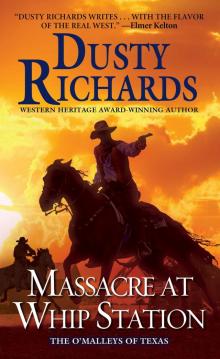 Massacre at Whip Station
Massacre at Whip Station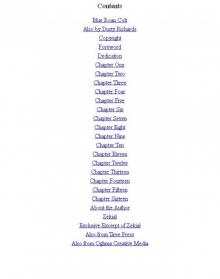 Blue Roan Colt
Blue Roan Colt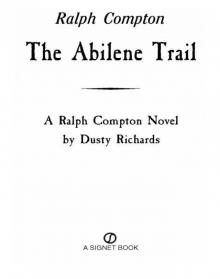 The Abilene Trail
The Abilene Trail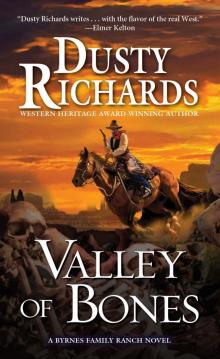 Valley of Bones
Valley of Bones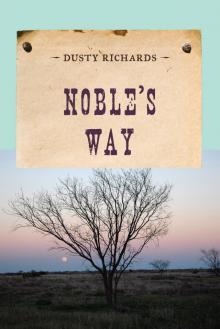 Noble's Way
Noble's Way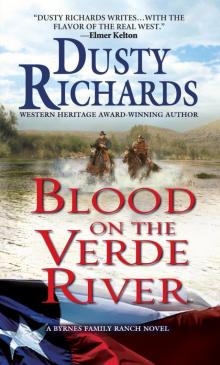 Blood on the Verde River
Blood on the Verde River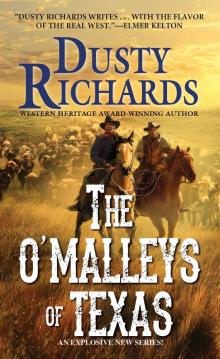 The O'Malleys of Texas
The O'Malleys of Texas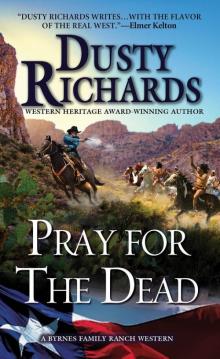 Pray for the Dead
Pray for the Dead Arizona Territory
Arizona Territory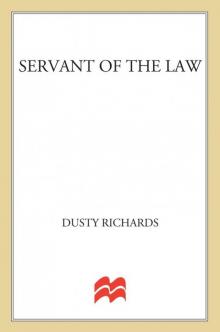 Servant of the Law
Servant of the Law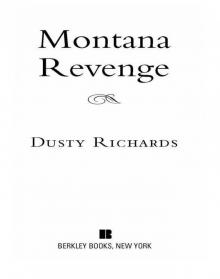 Montana Revenge
Montana Revenge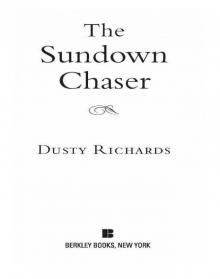 The Sundown Chaser
The Sundown Chaser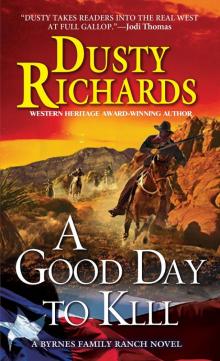 A Good Day To Kill
A Good Day To Kill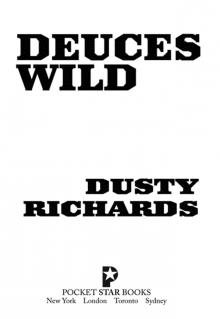 Deuces Wild
Deuces Wild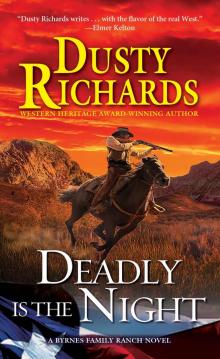 Deadly Is the Night
Deadly Is the Night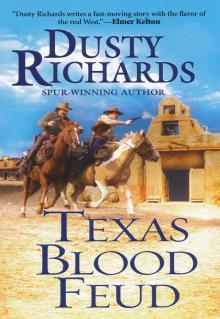 Texas Blood Feud
Texas Blood Feud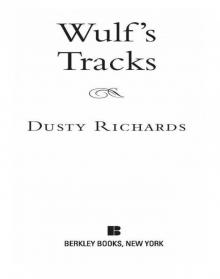 Wulf's Tracks
Wulf's Tracks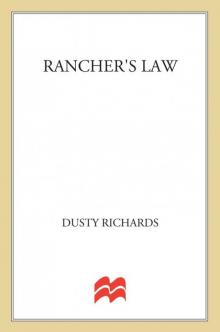 Rancher's Law
Rancher's Law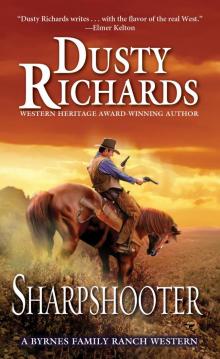 Sharpshooter
Sharpshooter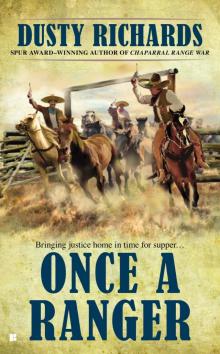 Once a Ranger
Once a Ranger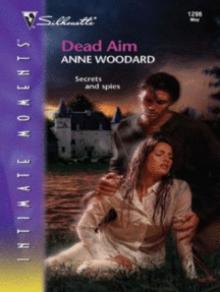 Dead Aim
Dead Aim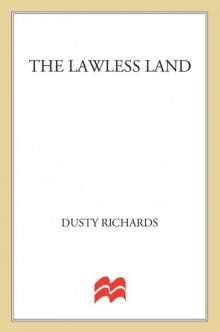 Lawless Land
Lawless Land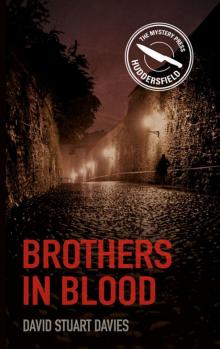 Brothers in Blood
Brothers in Blood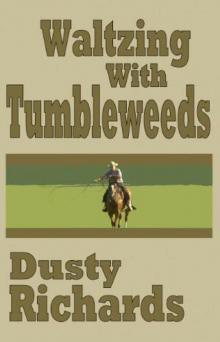 Waltzing With Tumbleweeds
Waltzing With Tumbleweeds